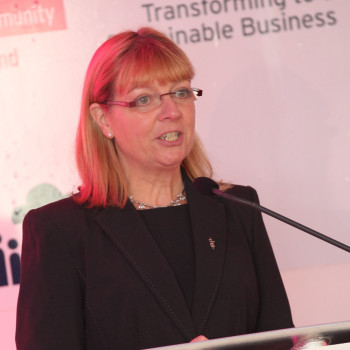Down to business

Founded in 2000, Business in the Community Ireland (BITCI) is a national non-profit organisation whose vision is for all businesses in Ireland to operate in a responsible and sustainable fashion. Gillian Hamill speaks to CEO Tina Roche to learn more about how Irish companies are progressing on this front
11 November 2014
“Many companies are using responsible business practices as the cornerstone of their strategic and sustainable planning for the future.”
American business tycoon Warren Buffett said, “It takes 20 years to build a reputation and five minutes to ruin it. If you think about that, you’ll do things differently.” So said. Irish businesses are increasingly adopting a similar attitude when it comes to ensuring their reputation for implementing sustainable practices is maintained, according to Business in the Community Ireland (BITCI), the networking organisation for corporate social responsibility (CSR).
The group’s CEO Tina Roche says: “Drawing on over a decade’s experience, BITCI has witnessed at first-hand a real sea change in the attitudes of Irish companies towards trust and reputation, with many companies using responsible business practices as the cornerstone of their strategic and sustainable planning for the future. These forward-thinking companies believe that customers, employees, investors and regulators place a high premium on trust and ethics and good governance are key in earning it.”
World class examples
Roche believes several major companies in Ireland have “started the journey on sustainability a long time ago and are slowly but surely getting to be best in class. You can see that when you look at the agri-food area, with companies such as Glanbia and Diageo, and their new plants, like the Diageo Brewhouse No. 4, which are all state-of-the-art and extremely green.” While these industry giants are “really driving sustainability”, small to medium enterprises are certainly not shirking their CSR obligations either, with Roche commenting: “We have small companies that are doing extraordinary things around saving energy and waste and water.”
The impetus behind this move towards ensuring sustainability standards are upheld, is “without a doubt” being driven by consumer demand, according to Roche. She cites recent research the organisation conducted with Amárach in October 2013. This reveals 72% of Irish adults said they would consider a company’s reputation when buying a product or services. As Roche points out: “It’s highest among the over 55s who are the ones with the largest disposable income and it’s lowest among the under 25s. Even there it’s high; 65% of under 25s said that they would consider a company’s reputation.”
A major factor driving this emphasis on reputation, according to Roche, is the instant appraisals and recommendations consumers can both give and receive on review sites such as TripAdvisor. “That type of recommendation is becoming widespread,” she says. “People are saying about basic products, I like this, this is good, or I don’t like the chemicals used in that product or that made my child sick. Before that kind of information would have been passed over the garden fence, but it is very much the case now that you can go online and get instant opinions. Just ask a question on one of the boards, and you [will] have 40 people commenting on it, so [the focus on reputation and recommendations] is definitely driven by consumers.”
 What’s more, Roche believes that some “extraordinary” work on the sustainability front is taking place within Ireland’s FMCG sector. “If you look at the grocery sector, there’s several extraordinary [companies] and I think it’s because it’s driven by consumer demand,” she says. “M&S recently won the corporate responsibility company of the year at the CSR Chain Awards. Carmel McQuaid, the head of sustainable business in Marks & Spencer, would be one of the best in the world. The work that they have done on their supply chain is extraordinary. Other than Marks & Spencer, definitely Tesco are driving sustainability and really trying to tackle any issues that they have. They have also done remarkable work with their supply chain.” She likewise praises the Musgrave Group as “best in class” in terms of implementing their strategic plans for sustainable developments.
What’s more, Roche believes that some “extraordinary” work on the sustainability front is taking place within Ireland’s FMCG sector. “If you look at the grocery sector, there’s several extraordinary [companies] and I think it’s because it’s driven by consumer demand,” she says. “M&S recently won the corporate responsibility company of the year at the CSR Chain Awards. Carmel McQuaid, the head of sustainable business in Marks & Spencer, would be one of the best in the world. The work that they have done on their supply chain is extraordinary. Other than Marks & Spencer, definitely Tesco are driving sustainability and really trying to tackle any issues that they have. They have also done remarkable work with their supply chain.” She likewise praises the Musgrave Group as “best in class” in terms of implementing their strategic plans for sustainable developments.
Guilt-free consumption
“You can’t sacrifice quality for price. What happens when that occurs is something like the horsemeat scandal.”
As well as looking into environmental considerations, Roche says retailers “have done massive research into what consumers consider a healthy lifestyle” and have found that “guilt-free consumption” is a major trend. People want to know that the goods they are buying will not hurt them, their children or the people involved in their production, for example, through the use of child labour in garment factories. According to Roche, consumers are much more aware of issues surrounding ethical sourcing nowadays, such as where the parts for their mobile phones come from and concerns around ‘blood diamonds’. “Ten years ago, you wouldn’t have heard [about such issues] but consumers talk about them quite knowledgeably now,” she notes.
This increased consumer awareness is reflected in the EU’s push towards mainstreaming responsible and sustainable business practices. In September of this year, the Council of the European Union officially adopted reforms on the disclosure of non-financial and diversity information by certain large companies and groups. Companies where the average number of employees exceeds 500, and exceeds either a balance sheet total of €20 million or a net turnover of €40 million, will be required to draw up on a yearly basis, a statement concerning environmental, social and employee-related matters, respect for human rights, anti-corruption and bribery matters. The new requirements which EU member states have two years to incorporate into domestic law, will be applicable in 2017.
Return on investment
Of course, most companies will always want to work in as ethical a manner as possible, but does ongoing sustainability involve making a large investment? Roche believes that being sustainable can involve investment, but also focusing on the smaller day to day tasks which do not cost much in monetary terms. “The vast majority of [sustainability initiatives] for most companies focus around energy, energy waste and transport. They’re probably the three things that are the low hanging fruit. At the other end of the scale, if you’re in production and you’re trying to find something that uses less energy or is more efficient in any way, that takes investment. The level of investment [varies] but most companies have worked out what kind of return on investment they want.”
On this subject, ShelfLife asks if she believes consumers are prepared to pay more for sustainable produce? “The research shows that they are, [or at least] that they say they are,” replies Roche. “But the test will be do they? I don’t have research to show that they do pay more for sustainable produce. I’m sure a certain percentage always do but I don’t know if it’s the same amount that say they would.” Subsequently, we may need several more years to discover whether what consumers say they will do, actually tallies with their purchasing habits. What we do know already however is that the discovery of unsustainable or unethical practices in a product’s supply chain will undoubtedly hurt that product’s sales.
Trust in supply chain crucial
“You can’t sacrifice quality for price,” says Roche. “What happens when that occurs is something like the horsemeat scandal. If you’re trying to drive the price down so far that there isn’t a living for everybody along the supply chain, something gives and what happens then is that bad practices creep in.” Trust along every link in the supply chain of a supermarket brand is essential according to Roche. “Often for those living in cities, you don’t know the butcher, you don’t know where the meat is coming from, that’s forced down the supply chain. You have to trust the person that you’re buying from. They’re often sourcing from a conglomerate; it’s not even that you’re buying from one single source but many sources so again, the level of acknowledgement and accountability is paramount. The product source might be three, four, five or six people – six buying relationships – away from you. If you look at the Musgrave Group, one of its key tenets is that a good deal is one where everybody comes out of it well. You’re not trying to screw a deal so tightly that somebody [along the supply chain] didn’t make a living out of it, that’s not the point.”
However, the Irish Farmers Association (IFA) has long argued that the country’s farmers are being squeezed to the pip and producing food at a loss. Roche comments: “You can’t have farmers producing at a loss [but] it’s complex and that’s why you need a government that will understand, ok how do we deal with that. Somebody producing at a loss isn’t sustainable and nor is overpaying for something, or an item costing more than the market can bear. If that’s the case you will have to find other ways of producing it. That’s how progress happens in fact; if you have to find an efficient way of producing something because the market will only bear a certain price.”
Making the mark
In regards to the government’s efforts to intervene in this dilemma in the shape of the Competition and Consumer Protection Bill 2014, Roche says: “Most [businesses] are looking at how do we pay a fair price, and how do we guarantee that, given the size and scale of the market. I do think that the legislation coming down the track will clarify that and a lot of [this type of legislation] is European-driven.”
One area where she thinks that Ireland has definitely got it right though, is in the introduction of Bord Bia’s Origin Green scheme. “It’s fantastic, I think it’s great, it’s enabling us to have the first certification of sustainable behaviours in our food chain. It really helps our reputation when we’re exporting.” The accreditation of standard behaviours in sustainable and responsible practices, through schemes such as Origin Green and BITCI’s own Business Working Responsibly mark, will further drive responsible behaviours, in Roche’s view. The organisation’s mark can also be used as framework for businesses to adopt the best measures in the workplace and the community and environment.
Nothing static about sustainability
“What we’re about is trying to get companies to be the most sustainable and responsible that they can be and I can see no reason why Ireland can’t be a centre of excellence for that,” says Roche. Explaining more about her role, she says that as well as meeting with clients and having discussions with government departments about how to best support the organisation’s mission, she does a great deal of reading up on future trends coming down the tracks and analysing research to find the best solution. “There’s nothing static in responsible or sustainable behaviour. We’re trying to figure out all the time, how do we manage a particular issue. Then when you find a solution, another issue will arise. All the time, we’re trying to drive best practice in companies and really helping our network and listening to them about what their needs are.”



 Print
Print








Fans 0
Followers